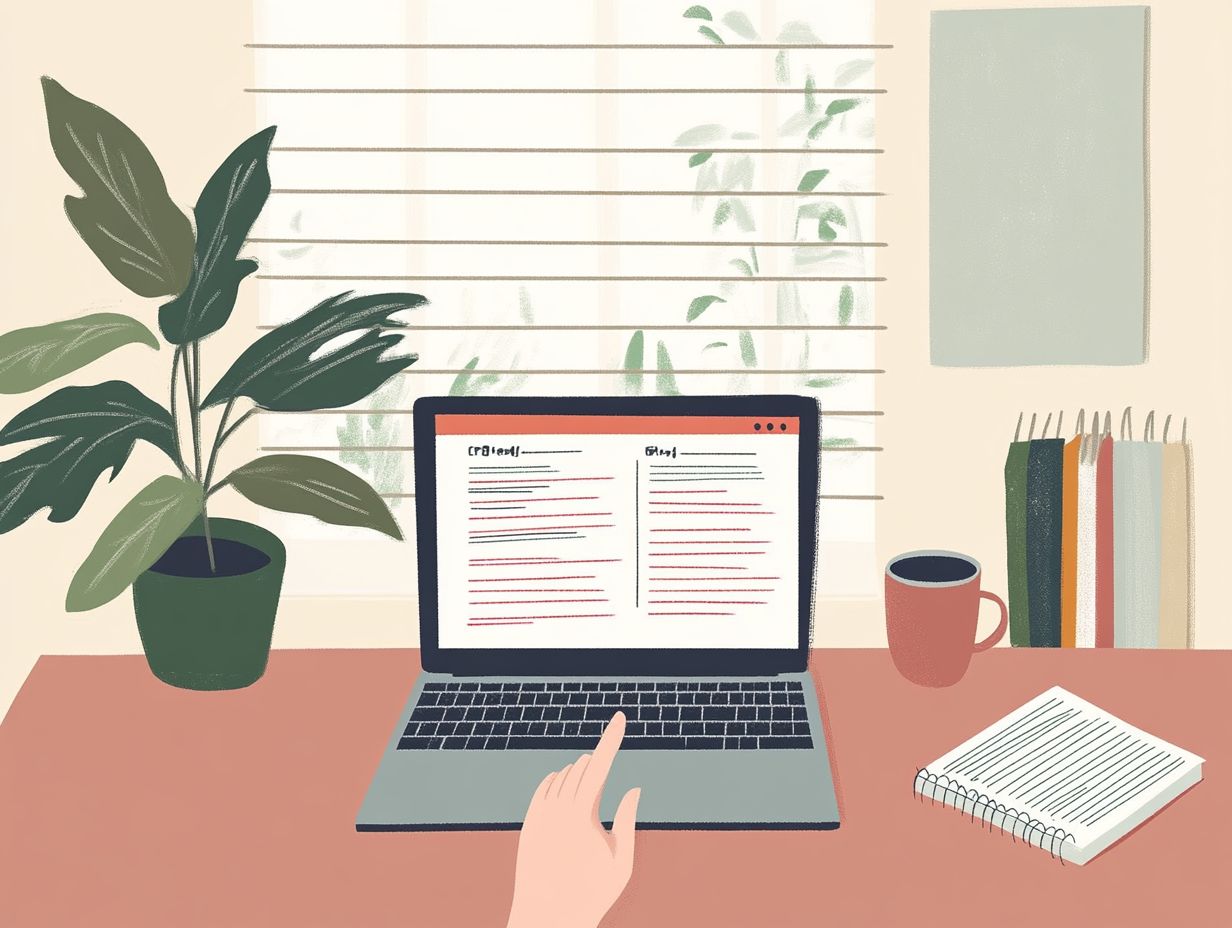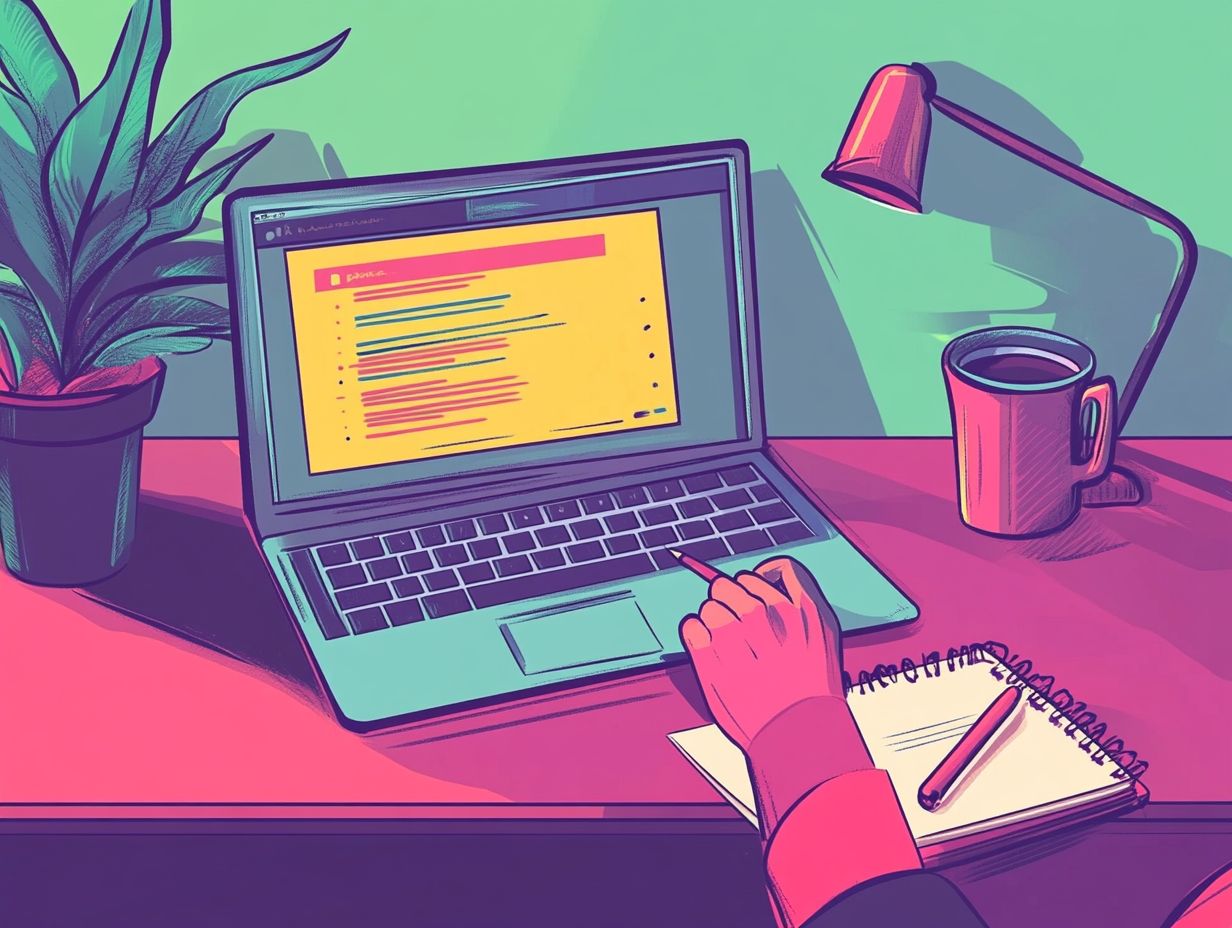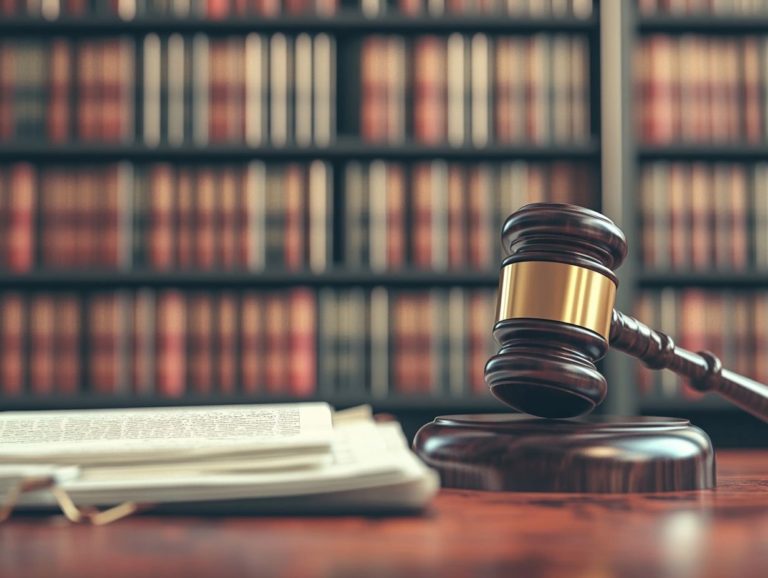5 Copyright Resources for Small Businesses
Navigating the world of copyright can feel overwhelming for small businesses, but understanding the basics is important for safeguarding your creative assets.
This article simplifies key aspects of copyright laws, outlining the registration process and delving into strategies for protecting your business against infringement. It also examines the legal use of copyrighted material and offers valuable resources to help you maintain compliance.
Whether you’re an aspiring entrepreneur or a seasoned business owner, this guide arms you with the essential knowledge you need to thrive in today s competitive landscape.
Contents
Key Takeaways:

- Understand the basics of copyright laws to protect your business and its assets.
- Registering for copyright can provide important legal protections for your business and its creations.
- Educate yourself on how to avoid copyright infringement and utilize copyrighted material properly to avoid legal consequences.
1. Understanding Copyright Laws
Understanding copyright laws is crucial for you as a small business owner. These laws govern the rights to original works, allowing creators like you to maintain control over your artistic expression while protecting against copyright infringement.
Understanding copyright law helps you navigate the complexities of ownership rights, fostering a compliant and efficient business environment. With copyright laws in play, you can enjoy the exclusivity of your creations be it music, literature, or art ultimately encouraging innovation and investment in new ideas.
Infringement can lead to severe consequences, including costly legal battles and a tarnished brand reputation. Being familiar with concepts like fair use, which is the legal ability to use someone else’s work in certain ways without permission, enables you to utilize existing works under specific conditions without violating copyright.
Organizations such as the U.S. Copyright Office are instrumental in overseeing these laws and helping creators protect their intellectual property. By grasping these nuances, you can enhance compliance and respect the rights of others while maximizing your own creative assets.
2. Copyright Registration Process
The copyright registration process is an essential step for you as a creator seeking to protect your original works. It offers valuable legal benefits, including eligibility for statutory damages and the ability to pursue claims in a copyright claims board.
To embark on your copyright registration journey, you ll need to gather the necessary documentation and identify the correct application form. This varies based on the type of work whether it s literary, artistic, or musical. Be aware of the associated fees, which can differ depending on whether you choose online or paper submissions.
Typically, the entire process may take several months, influenced by the workload of the U.S. Copyright Office. Registering your rights strengthens your legal standing in the event of infringement and grants you eligibility for statutory damages and attorney s fees, providing you with peace of mind.
By understanding these steps and their benefits, you can actively safeguard your intellectual property and navigate potential disputes with confidence.
3. Copyright Infringement and How to Protect Your Business

Copyright infringement presents a formidable challenge for small businesses. It can impose financial penalties and damages severe enough to disrupt operations. As a business owner, understanding how to shield your enterprise from copyright violations is imperative.
Navigating these legal frameworks is essential. Even unintentional missteps can lead to costly repercussions. The ramifications of copyright infringement often extend beyond mere financial penalties, frequently resulting in legal disputes that drain your valuable time and resources.
To protect yourself from these risks, consider pursuing copyright registration for your original works. This not only grants you legal protection but also serves as public acknowledgment of your ownership. Keeping meticulous documentation of your creation process can further strengthen your defense.
Engaging legal counsel to help you navigate compliance issues and grasp the intricacies of copyright law empowers your business to operate within legal boundaries. This promotes a marketplace that values respect and innovation.
4. Utilizing Copyrighted Material Legally
Utilizing copyrighted material legally is crucial for small business owners. To effectively manage this, consider exploring 5 IP strategy tools for small businesses that can help steer clear of infringement issues and promote ethical practices.
Concepts like fair use, permission use, and licensing agreements should guide your approach to using works owned by copyright holders. Understanding fair use is particularly vital as it allows limited use of copyrighted materials without a license. This is relevant for purposes such as criticism, commentary, news reporting, teaching, scholarship, or research. Assess whether your specific usage qualifies under this doctrine.
If fair use doesn t apply, obtaining permission through licensing agreements becomes essential for incorporating copyrighted content legally. Exploring Creative Commons licenses offers a way to use various works legally, as these licenses provide clear terms for reuse.
When sourcing images, stock photo sites ensure that you have the necessary rights to use professional imagery. Recognizing public domain materials gives you creative freedom, as these works aren t protected by copyright and can be freely used by anyone.
5. Resources for Small Businesses to Protect Their Copyrights
Small businesses have a wealth of resources at their fingertips to help protect their copyrights. You can tap into guidance from the U.S. Copyright Office and receive support from organizations like the Small Business Administration and the Minority Business Development Agency. Additionally, exploring 5 resources for learning about copyright law can provide further valuable insights.
These entities offer invaluable insight into navigating the complexities of copyright law, ensuring compliance, and safeguarding your intellectual property. Seek legal counsel through local bar associations and online legal service platforms, which provide tailored advice on copyright matters.
Leveraging these resources is essential for establishing a robust copyright strategy. They empower you to fully understand your rights and responsibilities, helping to mitigate potential legal disputes while enhancing your creative pursuits.
What Are the Consequences of Copyright Infringement?

The consequences of copyright infringement can be severe. They range from financial penalties and damages to the risk of facing legal challenges in small claims court. Understanding copyright laws is essential for anyone engaged in creative work.
Consider an artist who unwittingly uses a copyrighted image in their promotional materials. They could find themselves facing hefty fines and risking their reputation if a lawsuit is filed. Statutory damages can vary significantly, sometimes reaching thousands of dollars, depending on the seriousness of the infringement.
In one notable case, a musician was hit with substantial damages for sampling another artist’s work without permission. This serves as a stark reminder for creators whether individuals or small businesses to seek legal counsel when navigating these complex laws.
Understanding copyright infringement is vital. It can impact your finances, professional integrity, and future opportunities.
What Are the Differences Between Copyright, Trademark, and Patent?
Understanding the distinctions between copyright, trademark, and patent is essential for you as a small business owner. Each type of intellectual property provides unique protections for your ownership and creative rights.
By grasping these differences, you can make informed decisions that safeguard your original creations and brand identity.
Copyright primarily protects your original works think books, music, and art granting you exclusive rights to use and distribute what you ve created.
Trademarks protect symbols, logos, or phrases that identify your goods or services, helping consumers differentiate between brands. A catchy slogan or an eye-catching logo can be trademarked to prevent others from adopting similar identifiers.
Patents protect inventions, from groundbreaking technologies to innovative designs, giving you exclusive rights to your creations for a limited time.
By leveraging these forms of intellectual property, you can strengthen your market presence, deter potential infringement, and foster growth for your business.
How Can Small Businesses Avoid Copyright Infringement?
Small businesses can effectively avoid copyright infringement by closely following compliance regulations and understanding licensing terms. Ensure that your use of original works aligns with the relevant laws governing artistic expression.
Carefully checking your sources helps you significantly diminish the risk of unintentional violations.
It’s essential to familiarize yourself with fair use, as understanding its intricacies allows for limited usage of protected works without needing permission. When in doubt, consulting with legal counsel can provide invaluable insights into copyright regulations.
Education is paramount; by staying informed about copyright laws, you empower yourself to make astute choices in your creative pursuits, effectively safeguarding your interests and ensuring your business thrives.
What Are the Benefits of Registering for Copyright?

Registering for copyright offers numerous benefits, including enhanced protection, eligibility for statutory damages, and a stronger legal framework against unauthorized use of your works.
By formally securing your intellectual property, you equip yourself with a powerful means to defend your rights. This crucial step establishes a public record of ownership and streamlines the process of taking legal action if someone infringes upon your work.
The U.S. Copyright Office provides a straightforward registration process that s often just a few clicks away online. Once registered, you gain the ability to pursue statutory damages and attorney’s fees in lawsuits, giving you the power to safeguard your original creations and deter potential infringers.
How Can Small Businesses Protect Their Copyrights Online?
Protecting your copyrights online is more important than ever, especially in today s digital landscape where copyright infringement can easily arise through user-generated content and online publishing.
To safeguard your intellectual property, consider a variety of strategies to keep your assets secure.
- One effective method is watermarking your images; it adds a layer of protection while deterring unauthorized use.
- Implementing digital rights management (DRM) helps you control how your digital content is accessed and shared, providing peace of mind as a creator.
Understanding compliance regulations related to online content is equally important, as it equips you to navigate legal complexities. By actively monitoring digital platforms for any unauthorized use of your work, you can swiftly act against infringements, ensuring that your creative output maintains its value and recognition.
What Are the Common Myths About Copyright for Small Businesses?
Many small businesses find themselves caught up in myths about copyright. This misunderstanding can lead to costly legal issues that slow your growth; understanding essential trademark resources for startups can help clarify these matters.
A common myth is that fair use allows anyone to use copyrighted materials freely. In reality, it requires careful consideration of specific factors.
You may think your work is automatically protected by copyright. However, formal registration offers a stronger legal foundation if disputes arise.
Many small business owners mistakenly think that most online content is free to use. They might not realize that many creators retain rights to their work and need licenses for its use.






